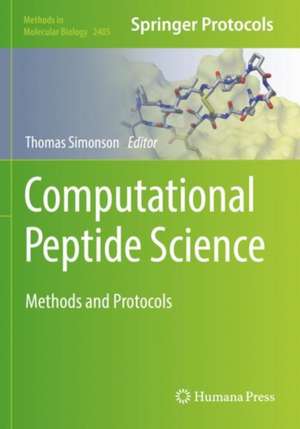Computational Peptide Science: Methods and Protocols: Methods in Molecular Biology, cartea 2405
Editat de Thomas Simonsonen Limba Engleză Paperback – 19 mar 2023
Authoritative and cutting-edge, Computational Peptides Science: Methods and Protocols aims to provide concepts, methods, and guidelines to help both novices and experienced workers benefit from today's new opportunities and challenges.
| Toate formatele și edițiile | Preț | Express |
|---|---|---|
| Paperback (1) | 956.69 lei 6-8 săpt. | |
| Springer Us – 19 mar 2023 | 956.69 lei 6-8 săpt. | |
| Hardback (1) | 1395.94 lei 6-8 săpt. | |
| Springer Us – 18 mar 2022 | 1395.94 lei 6-8 săpt. |
Din seria Methods in Molecular Biology
- 9%
 Preț: 791.59 lei
Preț: 791.59 lei - 23%
 Preț: 598.56 lei
Preț: 598.56 lei - 20%
 Preț: 882.95 lei
Preț: 882.95 lei -
 Preț: 252.04 lei
Preț: 252.04 lei - 5%
 Preț: 802.69 lei
Preț: 802.69 lei - 5%
 Preț: 729.61 lei
Preț: 729.61 lei - 5%
 Preț: 731.43 lei
Preț: 731.43 lei - 5%
 Preț: 741.30 lei
Preț: 741.30 lei - 5%
 Preț: 747.16 lei
Preț: 747.16 lei - 15%
 Preț: 663.45 lei
Preț: 663.45 lei - 18%
 Preț: 1025.34 lei
Preț: 1025.34 lei - 5%
 Preț: 734.57 lei
Preț: 734.57 lei - 18%
 Preț: 914.20 lei
Preț: 914.20 lei - 15%
 Preț: 664.61 lei
Preț: 664.61 lei - 15%
 Preț: 654.12 lei
Preț: 654.12 lei - 18%
 Preț: 1414.74 lei
Preț: 1414.74 lei - 5%
 Preț: 742.60 lei
Preț: 742.60 lei - 20%
 Preț: 821.63 lei
Preț: 821.63 lei - 18%
 Preț: 972.30 lei
Preț: 972.30 lei - 15%
 Preț: 660.49 lei
Preț: 660.49 lei - 5%
 Preț: 738.41 lei
Preț: 738.41 lei - 18%
 Preț: 984.92 lei
Preț: 984.92 lei - 5%
 Preț: 733.29 lei
Preț: 733.29 lei -
 Preț: 392.58 lei
Preț: 392.58 lei - 5%
 Preț: 746.26 lei
Preț: 746.26 lei - 18%
 Preț: 962.66 lei
Preț: 962.66 lei - 23%
 Preț: 860.21 lei
Preț: 860.21 lei - 15%
 Preț: 652.64 lei
Preț: 652.64 lei - 5%
 Preț: 1055.50 lei
Preț: 1055.50 lei - 23%
 Preț: 883.85 lei
Preț: 883.85 lei - 19%
 Preț: 491.88 lei
Preț: 491.88 lei - 5%
 Preț: 1038.84 lei
Preț: 1038.84 lei - 5%
 Preț: 524.15 lei
Preț: 524.15 lei - 18%
 Preț: 2122.34 lei
Preț: 2122.34 lei - 5%
 Preț: 1299.23 lei
Preț: 1299.23 lei - 5%
 Preț: 1339.10 lei
Preț: 1339.10 lei - 18%
 Preț: 1390.26 lei
Preț: 1390.26 lei - 18%
 Preț: 1395.63 lei
Preț: 1395.63 lei - 18%
 Preț: 1129.65 lei
Preț: 1129.65 lei - 18%
 Preț: 1408.26 lei
Preț: 1408.26 lei - 18%
 Preț: 1124.92 lei
Preț: 1124.92 lei - 18%
 Preț: 966.27 lei
Preț: 966.27 lei - 5%
 Preț: 1299.99 lei
Preț: 1299.99 lei - 5%
 Preț: 1108.51 lei
Preț: 1108.51 lei - 5%
 Preț: 983.72 lei
Preț: 983.72 lei - 5%
 Preț: 728.16 lei
Preț: 728.16 lei - 18%
 Preț: 1118.62 lei
Preț: 1118.62 lei - 18%
 Preț: 955.25 lei
Preț: 955.25 lei - 5%
 Preț: 1035.60 lei
Preț: 1035.60 lei - 18%
 Preț: 1400.35 lei
Preț: 1400.35 lei
Preț: 956.69 lei
Preț vechi: 1166.69 lei
-18% Nou
Puncte Express: 1435
Preț estimativ în valută:
183.09€ • 189.14$ • 152.37£
183.09€ • 189.14$ • 152.37£
Carte tipărită la comandă
Livrare economică 26 martie-09 aprilie
Preluare comenzi: 021 569.72.76
Specificații
ISBN-13: 9781071618578
ISBN-10: 1071618571
Pagini: 427
Ilustrații: XIII, 427 p. 93 illus., 83 illus. in color.
Dimensiuni: 178 x 254 mm
Greutate: 0.77 kg
Ediția:1st ed. 2022
Editura: Springer Us
Colecția Humana
Seria Methods in Molecular Biology
Locul publicării:New York, NY, United States
ISBN-10: 1071618571
Pagini: 427
Ilustrații: XIII, 427 p. 93 illus., 83 illus. in color.
Dimensiuni: 178 x 254 mm
Greutate: 0.77 kg
Ediția:1st ed. 2022
Editura: Springer Us
Colecția Humana
Seria Methods in Molecular Biology
Locul publicării:New York, NY, United States
Cuprins
Machine Learning Prediction of Antimicrobial Peptides.- Tools for Characterizing Proteins: Circular Variance, Mutual Proximity, Chameleon Sequences and Subsequence Propensities.- Exploring the Peptide Potential Of Genomes.- Computational Identification and Design of Complementary β-strand Sequences.- Dynamics of Amyloid Formation from Simplified Representation to Atomistic Simulations.- Predicting Membrane-Active Peptide Dynamics in Fluidic Lipid Membranes.- Coarse-grain simulations of membrane-adsorbed helical peptides.- Peptide dynamics and metadynamics: leveraging enhanced sampling molecular dynamics to robustly model long-timescale transitions.- Metadynamics Simulations to Study the Structural Ensembles and Binding Processes of Intrinsically Disordered Proteins.- Computational and Experimental Protocols to Study Cyclo-Dihistidine Self- and Co-Assembly: Minimalistic Bio-assemblies with Enhanced Fluorescence and Drug Encapsulation Properties.- Computational Tools and Strategies to Develop Peptide-Based Inhibitors of Protein-Protein Interactions.- Rapid Rational Design of Cyclic Peptides Mimicking Protein-Protein Interfaces.- Structural prediction of peptide-MHC binding modes.- Molecular Simulation of Stapled Peptides.- Free Energy-Based Computational Methods for the Study of Protein-Peptide Binding Equilibria.- Computational Evolution Protocol for Peptide Design.-Computational design of miniprotein binders.- Computational Design of LD Motif-Peptides with Improved Recognition of the Focal Adhesion Kinase FAT Domain.- Knowledge-based unfolded state model for protein design.
Textul de pe ultima copertă
This volume details current and new computational methodologies to study peptides. Chapters guide readers through antimicrobial peptides, foldability, amyloid sheet formation, membrane-active peptides, organized peptide assemblies, protein-peptide interfaces, prediction of peptide-MHC complexes, advanced free energy simulations for peptide binding, and methods for high throughput peptide or miniprotein design. Written in the format of the highly successful Methods in Molecular Biology series, each chapter includes an introduction to the topic, lists necessary materials, software, and reagents, includes tips on troubleshooting and known pitfalls, and step-by-step, readily reproducible protocols.
Authoritative and cutting-edge, Computational Peptides Science: Methods and Protocols aims to provide concepts, methods, and guidelines to help both novices and experienced workers benefit from today's new opportunities and challenges.
Authoritative and cutting-edge, Computational Peptides Science: Methods and Protocols aims to provide concepts, methods, and guidelines to help both novices and experienced workers benefit from today's new opportunities and challenges.
Caracteristici
Includes cutting-edge methods and protocols Provides step-by-step detail essential for reproducible results Contains key notes and implementation advice from the experts
